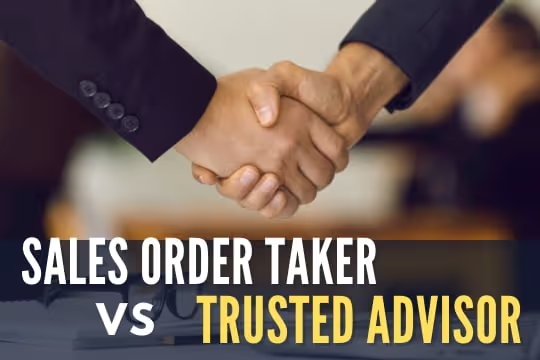

Employees and outsourced professionals play roles that contribute to company productivity and growth. Comparing functions between an order taker vs. a trusted advisor can help a small business determine what workforce to build. Certain companies call for more order takers, while others that use automation for orders may have more of a need for trusted advisors.
The main difference between order takers and trusted advisors is the former are usually low-level assistants while the latter indicates more experienced, knowledgeable, and skilled talent. The difference can be further understood by comparing a server at a fine dining restaurant with one at a more casual diner. The server at the fancier establishment plays the role of a trusted advisor who makes meal recommendations. Servers who are just order takers at casual restaurants don't command the same level of trust with customers.
The diner example illustrates the concept of how trusted advisors have more authority and are perceived to have more profound expertise than order takers. But the more significant the project, the more the consultant must answer to several executives and stakeholders. A graphic designer hired by a small firm, by contrast, might be given complete or partial creative control and only respond to one decision-maker.
Furthermore, trusted advisors have more significant impacts on sales than order takers. A customer in a retail store is more likely to trust a sales rep with profound product knowledge than one who has only been trained for data entry. Trust is closely linked to customer loyalty, which many businesses now prioritize and enhance.
Entrepreneurs must weigh the pros and cons of the order taker vs. trusted advisor comparisons when building a diverse and talented workforce. Many times a startup's initial team performance is what makes or breaks the company. So employers must decide whether their company can benefit from hiring order takers, trusted advisors, or both.
Overcoming the most demanding challenges faced by entrepreneurs helps pave the road to success. These challenges include achieving cash flow consistency, establishing a budget that accounts for emergencies, and expecting the unexpected.
A trusted advisor is someone who builds trust through honest communication, transparency, and dedication to a long-term product or service. Here's an equation known as "The Influencing Formula" used in team-building:
This equation points to several proactive characteristics management should look for when hiring talent that leans more toward leadership. These characteristics include honesty, authenticity, acting with integrity, and keeping commitments. Steps advisors can take to gain trust include respecting others and their differences, getting other people's feedback, and ensuring personal interests don't create conflicts. It helps to acknowledge one's own mistakes and the contribution of other team players.
Preparation for becoming an influencer involves a system called SARIE, which stands for Situation, Analysis, Recommendations, Implementation, and Evaluation. This type of ecosystem generates more credible recommendations than systems with limited scope.
Courage is necessary to become a trusted advisor because it's easy to fear giving wrong advice. Not all advice is treated as welcome in conversations, notably when the advisor lacks credentials in the field in which they are commenting. It's also important to have courage as a driving force for moving up the career ladder.
Not only does a sales agent or consultant play the role of a trusted advisor, so does a manager who supervises a staff or anyone who works with an assistant. Several team members may play the advisor role, mainly financial and marketing analysts. A professional can construct an advisor persona once they develop the components of The Influencing Formula (trust, preparation, and courage).
Trusted advisors are held in higher regard than order takers partly in response to the advisor's title, position, and background. But it's still possible to assume the advisor role if the employee is adequately prepared and dares to do so. Advisors must be more proactive and ready to help others by answering questions. In contrast, order takers don't necessarily know much about their companies other than the forms and processes they use.
Seeking an influential position means constantly expanding one's knowledge in the field. Learning business needs for projects is part of the path to becoming a successful consultant. Building trust with stakeholders and maintaining relationships are other essential parts of the equation. Telling people what they need to know to improve their image or performance is crucial to the influencer role.
The order taker vs. trusted advisor discussion is vital for organizations that hire various levels of talent. Trusted advisors are viewed as more advanced professionals who understand efficiency, decision-making dynamics, and how to streamline a business. Contact the EMA online experts to learn more about making assessments for business improvements.
A sales order taker primarily processes requests and follows set procedures, while a trusted advisor uses expertise to guide decisions, suggest improvements, and build long term relationships. The advisor holds greater authority, autonomy, and strategic influence than the transactional order taker.
Small businesses lean toward order takers when tasks are repetitive, highly scripted, or easily automated, and when budget limits training or deep expertise. They favor trusted advisors when selling complex products, designing strategy, or needing guidance that strengthens customer loyalty and drives growth.
Trusted advisors display honesty, authenticity, integrity, preparedness, and courage. They communicate transparently, keep commitments, respect differences, seek feedback, and avoid conflicts of interest. Using SARIE—situation, analysis, recommendations, implementation, evaluation—they craft credible solutions. Consistent learning and admitting mistakes further reinforce the trust component.
By combining deep product knowledge with genuine concern for client goals, trusted advisors recommend tailored solutions, resolve objections, and foster confidence. Customers who feel understood are likelier to repurchase, refer others, and pay premium prices, boosting revenue and lifetime value beyond what transactional order takers typically achieve.
Start by mastering existing processes, then expand product knowledge and industry insight. Seek mentorship, study customer challenges, propose thoughtful suggestions, and request feedback. Practice clear, honest communication and document results that prove value. Over time, this proactive approach builds credibility, shifting perception from task handler to trusted advisor.